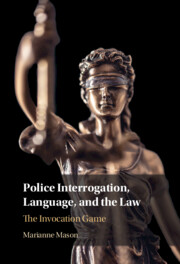Book contents
- Police Interrogation, Language, and the Law
- Police Interrogation, Language, and the Law
- Copyright page
- Contents
- Figures
- Tables
- Acknowledgments
- 1 Introduction
- 2 In the Judges’ Own Words: The Law and Custodial Interrogation in the United States
- 3 Police Interrogation in the United States: From the Reid Technique to the High-Value Detainee Interrogation Group Report
- 4 The Invocation Game: The Prelude to Custodial Interrogation
- 5 Invocations for Counsel, the Rulings, and the Courts: A Statistical Analysis of the Corpus
- 6 Police Interrogation Reform in the United States: Paths to Consider
- Appendix: Jurisdictions and Case Counts
- Glossary
- References
- Index
2 - In the Judges’ Own Words: The Law and Custodial Interrogation in the United States
Published online by Cambridge University Press: 23 December 2023
- Police Interrogation, Language, and the Law
- Police Interrogation, Language, and the Law
- Copyright page
- Contents
- Figures
- Tables
- Acknowledgments
- 1 Introduction
- 2 In the Judges’ Own Words: The Law and Custodial Interrogation in the United States
- 3 Police Interrogation in the United States: From the Reid Technique to the High-Value Detainee Interrogation Group Report
- 4 The Invocation Game: The Prelude to Custodial Interrogation
- 5 Invocations for Counsel, the Rulings, and the Courts: A Statistical Analysis of the Corpus
- 6 Police Interrogation Reform in the United States: Paths to Consider
- Appendix: Jurisdictions and Case Counts
- Glossary
- References
- Index
Summary
Chapter 2 explores how law enforcement’s ability to engage discursively with suspects and other lay persons is limited by the law. Judicial rulings regarding suspects’ rights during custodial interrogation, such as the right to counsel, provide insights into how the United States federal court system, led by the main court of the land the Supreme Court of the United States, views suspects’ constitutional rights, on the one hand, and the societal benefit of police officers being able to conduct criminal investigations, on the other. The chapter discusses the evolution of the right to counsel in the federal courts, since the seminal Miranda v. Arizona (1966) ruling, and the insights this history provides in framing the law as a facilitator or, alternatively, a deterrent to suspects invoking their right to counsel, prior to the onset of custodial interrogation. This analysis of opinions from the Court, circuit courts, district courts, and a few military courts, that make up the book’s corpus, will shed light on how judges have viewed the role of police in society, through time, and whether some in the judiciary consider the Miranda ruling as overreaching in its ‘intended’ constitutional protections.
Keywords
- Type
- Chapter
- Information
- Police Interrogation, Language, and the LawThe Invocation Game, pp. 14 - 67Publisher: Cambridge University PressPrint publication year: 2023

